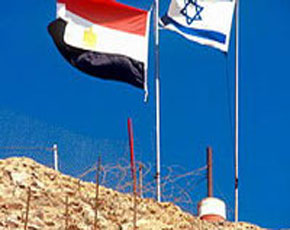Editor’s Note – Tensions rise after the election of Muslim Brotherhood ministers and the presidency.
Alarmed Israel tightens its Sinai border
From Space War.com
The Israeli military will deploy mobile radar systems along the Sinai border with Egypt amid fears that Palestinians, possibly aided by militants linked to al-Qaida, plan to step up attacks on the Jewish state.
The emergence of a jihadist organization in the vast wilderness of the Sinai Peninsula on Israel’s southern flank, its least defended frontier, is causing deep concern in Israel’s military and intelligence establishment because it may reflect Egypt’s lurch toward Islamist rule.
Until 2011, Palestinian rocket attacks were launched from the Hamas-run Gaza Strip, and Israeli forces retaliated without hindrance, usually with airstrikes, and in December 2008 a 22-day invasion by a large ground force.
But the Feb. 11, 2011, downfall of Egyptian President Hosni Mubarak, a staunch supporter of Egypt’s 1979 peace treaty with Israel, in a pro-democracy revolution, immensely complicated Israel’s security situation on its southern border.
Mubarak’s ouster after weeks of bloodshed in the streets put the future of the landmark pact, which the vast majority of Egypt’s 82 million oppose, in serious doubt.
There have been several attacks mounted from Sinai since August 2011, when eight Israelis were killed in the worst terrorist assault in years. Two 122mm rockets fired from southern Sinai hit Israel earlier this month.
A jihadist group calling itself the Mujahedin Shura Council in the Environs of Jerusalem claimed responsibility for a June 18 attack from Sinai that killed an Israel and triggered a gun battle in which two attackers died.
This has coincided with a weeklong surge in rocket attacks from Gaza that drew retaliatory airstrikes in which several Palestinians were killed.
Tension remains high and there’s been talk of another Israeli ground offensive.
In December 2011, an Islamist group named Ansar al-Jihad in the Sinai Peninsula announced its formation, the first jihadist organization in the region, and pledged loyalty to al-Qaida.
“Terrorist bases are being established in Sinai and we expect the Egyptians to restore sovereignty there,” declared Israel’s chief of staff, Lt. Gen. Benny Gantz.
“If international awareness does not spur immediate Egyptian action to address the growing security vacuum and increased terrorist incidents on the border with Israel, the Sinai powder keg may soon explode,” observed retired Brig. Gen. Michael Herzog, a former head of the Israeli military’s Strategic Planning Division.
Cairo’s hold over the Sinai Peninsula, the westernmost edge of the Arab world which Israel captured in 1967, was never strong, even after Israel returned the region under the 1979 treaty.
 The sparsely populated region, which is largely desert, has long been neglected by Cairo.
The sparsely populated region, which is largely desert, has long been neglected by Cairo.
Even before Mubarak’s ouster, disgruntled Bedouin tribesmen were gravitating toward al-Qaida, which is reported to have built up a network that has in recent months begun hitting Israel, or allowed Gaza militants to launch attacks from there.
The post-Mubarak political rise of the Islamist Muslim Brotherhood has further deepened alarm in Israel that its southern border, calm and pretty much undefended for the last three decades, is once more becoming a combat zone.
The Muslim Brotherhood, founded in Egypt in 1928 and subsequently the godfather of just about every radical Islamist group in the Arab world, has made spectacular political gains since Mubarak was booted out.
The organization dominates Egypt’s Parliament with other Islamists and on Sunday Mohamed Morsi, a Muslim Brotherhood leader who served years in Mubarak’s prisons, was declared the country’s first freely elected president.
He narrowly beat the military’s candidate, former air force chief Ahmed Shafiq, Mubarak’s last prime minister.
The Muslim Brotherhood has publicly declared it will observe all foreign treaties signed during Mubarak’s three-decade dictatorship. But the Israelis, increasingly jumpy because of the bloodbath in neighboring Syria, Iran’s nuclear program and a recent surge in Palestinian attacks from Gaza, fear Egypt’s new leadership will make little effort to restore control in Sinai, and might even encourage attacks.
“The challenge Israel is facing in the Sinai is very similar to the daily terror threats it faces in the Gaza Strip,” noted The Jerusalem Post’s military expert, Yaakov Katz.
“But here’s the main difference: while Israel can retaliate and respond militarily to attacks from Gaza, its hands are — for the time being — tied in face of the same threats it faces from Egypt Â… even if it knows about a ticking terrorist bomb.”


